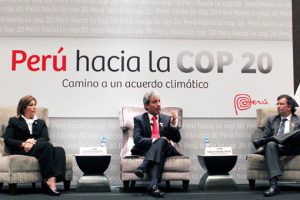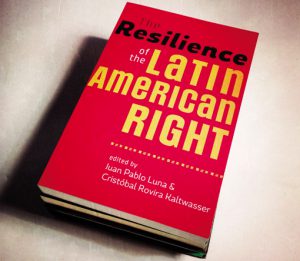
Climate Change: COP 20 in Peru
As host of the upcoming United Nations Climate Change Conference in December, Peru has assumed a challenging burden. Ministers and high representatives of 195 countries and international organizations, along with roughly 15,000 visitors, will gather in Lima to mark the 20th annual session of the Conference of the Parties (known as COP 20)—the governing body … Read more

The Electoral Challenge for the Western Hemisphere
After more than three decades of experience with representative democracy, most Latin American countries have successfully reduced ballot-stuffing and other forms of election-day fraud, only to be faced with a different challenge: ensuring that elections are truly competitive. The legacy of concentrating power in iconic personalities or political parties gives incumbents around the region an … Read more

10 Things to do in Nashville
Nashville’s place in America’s musical heritage has always made it a must-see destination for country music fans. But an expanding food scene and growing cultural diversity, propelled by a wave of new immigrants, has transformed “Music City” into the new “it” city. 1. Visit an American icon. No visit to Music City is complete without … Read more

Manos Sucias
Brothers Delio and Jacobo stand by as two Colombian military officers inspect their boat, desperately hoping their stash of cocaine submerged just below the water won’t be discovered. After a few tense minutes, the officers depart, leaving the brothers to await further instructions from the drug lords. This is just one of several suspense-filled scenes … Read more

DIY Wine
Like many wine aficionados, José Manuel Ortega Gil-Fournier wondered what it would be like to bottle his own varietal. To turn his dream into a reality, the Spanish-born investment banker left his successful career to start his own vineyard. But this venture came with an innovative entrepreneurial twist. Launched in 2012, his O. Fournier Wine … Read more

The All Souls Procession
The unique All Souls Procession in Tucson, Arizona, draws its inspiration from the traditional Mexican holiday Día de los Muertos (Day of the Dead). Launched in 1990 as a performance piece by local artist Susan Johnson to commemorate her late father, it has grown to become a two-day event that melds a myriad of cultural … Read more

Brazil: The Troubled Rise of a Global Power
Brazil’s most well-known cartoonist, Ziraldo Alves Pinto, said in 2010 that his country ought to have an exclamation point after its name, considering the excitement that accompanied most discussions of the southern hemisphere’s powerhouse economy at the time. The euphoric approach was matched by the international media: a November 2009 cover of The Economist magazine … Read more

The Resilience of the Latin American Right
Unlike the internationalist left over the past century, the Latin American right has never been united by a single symbol or slogan. This was not accidental. In a region that only recently abandoned military dictatorship, why would political parties openly identify with repressive authoritarian regimes? And with 165 million people still living in poverty, hoisting … Read more

Brazil and Trade: Brazil’s Ambivalent Welcome to the World
Just a few years ago, Brazil was brimming with optimism. Rising global demand for resources led to an export and consumption boom. The official poverty rate was declining sharply, thanks to an expansion of the social safety net and falling unemployment. When GDP growth hit 7.5 percent in 2010, it seemed that the “sleeping giant” … Read more

Policy Advocacy: NAFTA and the New Regionalism
The world has changed dramatically since the North American Free Trade Agreement (NAFTA) was signed. Today, 20 years later, we live in an era of mega-regionalism. This new reality calls for a new strategic vision for North America. “Distant neighbors.” That’s how Alan Riding, then The New York Times bureau chief in Mexico, labeled the … Read more

Security in South America: The Role of States and Regional Organizations by Rodrigo Tavares
Nowhere in the world is the web of treaties, agreements and agencies concerned with regional security needs as thick as in Latin America. The region has seen one of the most dramatic institutional transformations of the late twentieth and early twenty-first century. Among the many reasons for this transformation is the widespread rejection of U.S. … Read more

Ask the Experts: Higher Education
Artur Cherbowski Lask answers: It’s important to keep in mind that a region consists of different countries, each with its own needs and strengths, and bound to its particular culture and history—although tied firmly to a common, shared history and culture. In this mosaic, universities try to respond to their regional, national and local demands. … Read more

Behind the Numbers: Women’s Rights
The gender-based data on social inclusion clearly indicate the opportunities and obstacles facing women in Latin America—as well as numerous contradictions and complexities. An examination of new trends, laws and policies brings to mind the Spanish expression, “Del dicho al hecho, hay mucho trecho.” In other words, even in many areas where there appears to … Read more
Behind the Numbers: Insecurity and Marginalization in Central America
With 11 homicides per 100,000 inhabitants in 2012, Nicaragua stands out as a relatively fortunate exception in a region whose homicide rates rank among the world’s highest. Its northern neighbors all recorded rates at least three times greater: with Guatemala at 34.3 murders per 100,000 citizens; El Salvador at 41.5; and—at the top of this … Read more

Oil Sparks in the Amazon: Local Conflicts, Indigenous Populations, and Natural Resources by Patricia I. Vásquez
Since the early 1990s, the rising price of crude oil and other key natural resources—and the resulting drive by governments and private companies to extract those resources—has led to sharp conflicts in Latin America. At the core of these disputes is the clash between national economic interest and the rights of Indigenous people inhabiting the … Read more


